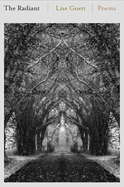
In The Radiant, Lise Goett's luminous third poetry collection, bodies prove disappointingly fragile, yet memory, nature, and wisdom are forces that endure.
The speaker in "After a Dark Tunnel, Uplift, Lift" references a cancer experience and imagines escaping the flesh to diffuse into the cosmos: "I a dandelion's spent head become the specular image, a mere spirit/ of the body blown out to some new seeding." Such a disembodied future evokes freedom rather than sorrow, as in "Difficult Body," when "the soul slips/ from its cerement, and goes to live like a fruit bat in the rafters.../ knowing no bounds."
Goett (Leprosarium) explores liminal moments and ponders what survives a loss. The use of the word "terminal" in "Free Fall" denotes mortality while also bringing up fond memories of the speaker's late father picking her up from an airport. Mythical allusions, religious imagery, and Buddhist philosophy weave through to shine ancient perspective on current struggles. "Wabi-Sabi" (which interprets the Japanese term as "blossoming" and "decay," denoting acceptance of transience) marks seasonal rhythms and hopes that "transformation" and "enlightenment" might accompany death.
The collection luxuriates in abstruse vocabulary--"fascicle," "haruspex," "reliquary"--and sensual descriptions of snow, trees, and colors ("yellowing into a Sauterne end-of-day"). Internal rhymes ("How could you help/ but become magma, enigma?") and alliteration ("the craniumed, crinolined brain") make for passages worth savoring. The topics vary--a medicine man's exploits, summiting Mount Everest, women's rage--but the poems are united by Goett's astute vision: "Life's all about slow drift./ What counts is not how fast you arrive/ but the weight of what you carry with you." --Rebecca Foster, freelance reviewer, proofreader and blogger at Bookish Beck

